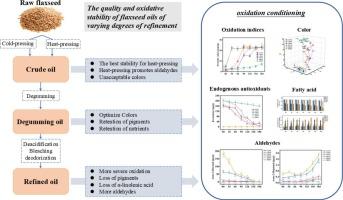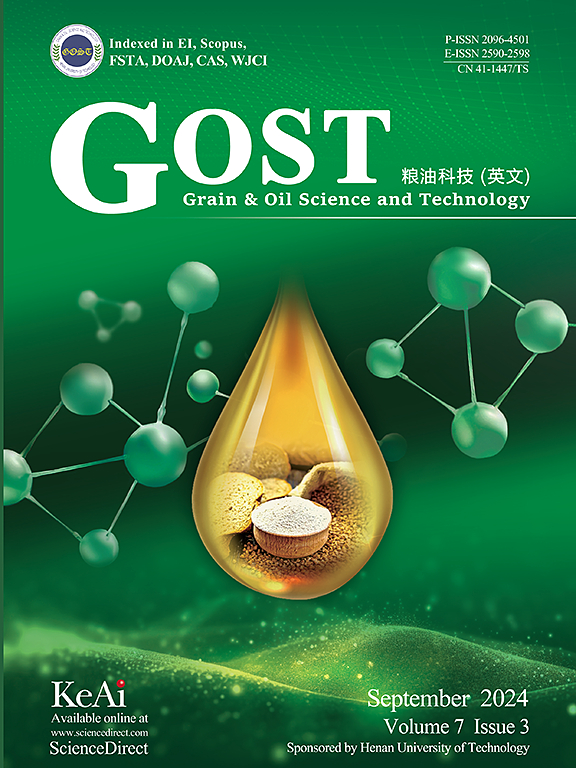不同精制程度的亚麻籽油的质量和氧化稳定性
Q2 Agricultural and Biological Sciences
引用次数: 0
摘要
亚麻籽油是植物性ω-3 α-亚麻酸的重要来源,在精炼和储存过程中容易氧化和形成有害物质。本研究评估了精炼阶段(粗制、脱胶、完全精炼)对亚麻籽油中醛、反式脂肪酸和氧化稳定性的影响。结果表明,热压油颜色较深,a、b β值较高,但在氧化过程中表现出较高的氧化稳定性。然而,与冷压相比,热压促进了另外三种醛的产生,丁烯醛,壬醛和反式,反式-2,4-十烯醛。脱胶在保持α-亚麻酸的同时,优化了原油的颜色。相反,完全精制(脱胶、脱酸、漂白、脱臭)导致了大量类胡萝卜素和多酚的损失,α-亚麻酸减少了3.48% - 4.47%,反式脂肪酸也大量产生。此外,完全精炼不仅导致新生丙烯醛和反式2标称的形成,而且导致大多数醛的浓度显著增加。本研究为考虑多不饱和脂肪酸氧化和异构化诱导的有害物质的形成对亚麻籽油的加工提供了参考。本文章由计算机程序翻译,如有差异,请以英文原文为准。

The quality and oxidative stability of flaxseed oils of varying degrees of refinement
Flaxseed oil, a key source of plant-based ω-3 α-linolenic acid, is susceptible to oxidation and hazardous substance formation during refining and storage. This study evaluated the effects of refining stages (crude, degumming, complete refining) on aldehydes, trans fatty acids, and oxidative stability in flaxseed oil. The results indicate that heat-pressed oil has dark color with high a⁎ and b⁎ values, but exhibits the relatively highest oxidative stability during the oxidation process. However, compared to cold-pressing, heat-pressing promotes the generation of three additional aldehydes, butenal, nonanal, and trans, trans-2,4-decadienal. Degumming optimizes the color of crude oil while maintaining α-linolenic acid. In contrast, complete refining (degumming, deacidification, bleaching, and deodorization) caused the loss of substantial carotenoids and polyphenols, and α-linolenic acid decreased by 3.48 %–4.47 %, as well as a large amount of production of trans fatty acids. In addition, complete refining not only leads to the formation of newborn acrolein and trans-2-nominal but also results in a significant increase in most aldehydes concentration. This study provides a reference for the processing of flaxseed oil when considering the formation of hazardous substances induced by the oxidation and isomerization of polyunsaturated fatty acids.
求助全文
通过发布文献求助,成功后即可免费获取论文全文。
去求助
来源期刊

Grain Oil Science and Technology
Food Science
CiteScore
7.30
自引率
0.00%
发文量
69
审稿时长
12 weeks
期刊介绍:
 求助内容:
求助内容: 应助结果提醒方式:
应助结果提醒方式:


